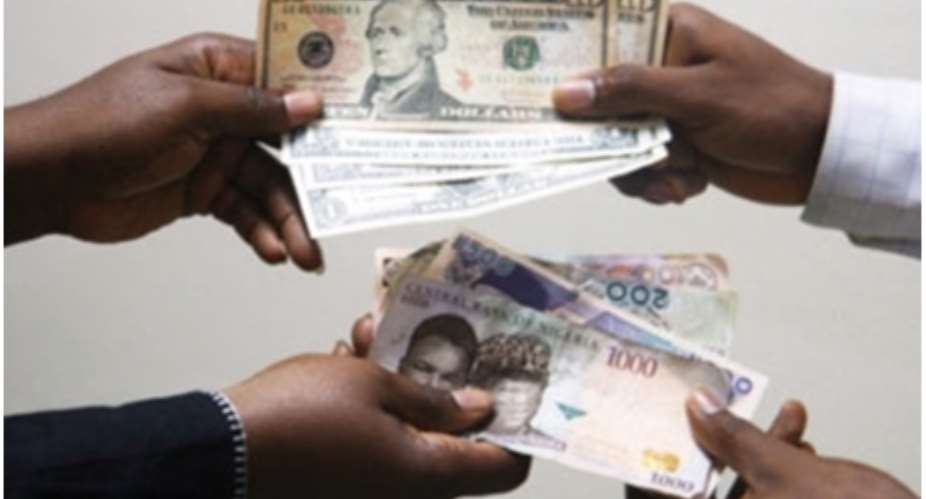An exchange rate is the rate at which one currency can be exchange for the other. For instance if you are to travel to another country, you need to ‘buy’ the local currency.
Just like the price of any asset, the exchange rate is the price at which you can buy that currency. If you are traveling from Nigeria to Ghana for example and the exchange rate 1:50.68, this means that for every 1 GHS, you can buy 50.68 NGN.
In the ideal world, identical assets should sell at the same price in different countries, because the exchange rate must maintain the basic value of one currency against the other.
There are two ways to price of a currency can be determined against one another: Fixed or pegged exchange rate and the Floating exchange rate.
In a fixed or pegged exchange rate system, the government (Central Bank) sets and maintains an official rate. Thus a set price will be determined against a major world currency.
Floating exchange rate, unlike the fixed is determined by the private market through supply and demand.
If there is short in supply of a currency the cost or price for that currency increases, just as the scarcity of any commodity appreciates in price. When a country’s local currency drastically falls in value against the major trading currencies, it affects price of imported goods since more of a local currency will be required to get, let’s say a dollar. The fall in value of the local currency (naira) as against a major trading currency (dollar) will make imported goods more expensive and stimulate demand for local goods and services.
The stimulant in the demand for local goods will generate more jobs and also attract more foreign investment (FDI) in a country.
Investors are more comfortable in investing in economies with a floating exchange rate regime as they are able to almost get the equivalent money value of their investment gains to either import more raw materials or repatriate profits into their home country without making a loss or feel cheated.
In recent times one of the biggest economies in Africa, Nigeria, has switched from a fixed exchange rate system since February, 2015 to the floating exchange rate system.
Why would Nigeria in one moment resort to the use of a fixed system and the switch to a floating exchange rate system?
Due to Nigeria’s major dependant on oil for revenue, the recent major drop in global oil prices caused the country a steep fall in its revenue for the first time since 2004.
As a result of a drop in revenue, there has not been enough foreign reserves for the central bank of Nigeria (CBN) to release into the economy to respond to the demand needed by the economy. And if foreign reserves of the CBN are short in supply, the effect will drive to weaken the local currency drastically as more naira will be used to buy these major traded currencies (euro, dollar etc.).
As expected by the CBN, a short in supply of the world major currencies will cause the value to increase against the naira drastically in the fullness of time when paired with the major currencies. The ripple effect will be an inflation rippling the economy apart.
So for the CBN to avoid a total wreckage to the biggest economy in Africa due to a major fall in global oil prices which has continuously reduced its foreign reserves, CBN needed to fix or peg the naira rate against the major trading currencies to stabilize the any drastic fall of the naira value and control inflation.
But a prolonged period of holding a currency at an artificial level often has a disruptive effect as foreign companies become reluctant to import goods when they are paid at a distorted levels.
As global oil prices has began to climb high, it seems the CBN is forecasting an increase in its foreign reserves. In view of this, the CBN has allowed the embattled naira to trade freely, that is, using the floating exchange rate which in fullness of time will autocorrect the economy.





 Former Kotoko Player George Asare elected SRC President at PUG Law Faculty
Former Kotoko Player George Asare elected SRC President at PUG Law Faculty
 2024 elections: Consider ‘dumsor’ when casting your votes; NPP deserves less — P...
2024 elections: Consider ‘dumsor’ when casting your votes; NPP deserves less — P...
 You have no grounds to call Mahama incompetent; you’ve failed — Prof. Marfo blas...
You have no grounds to call Mahama incompetent; you’ve failed — Prof. Marfo blas...
 2024 elections: NPP creates better policies for people like us; we’ll vote for B...
2024 elections: NPP creates better policies for people like us; we’ll vote for B...
 Don’t exchange your life for wealth; a sparkle of fire can be your end — Gender ...
Don’t exchange your life for wealth; a sparkle of fire can be your end — Gender ...
 Ghana’s newly installed Poland train reportedly involved in accident while on a ...
Ghana’s newly installed Poland train reportedly involved in accident while on a ...
 Chieftaincy disputes: Government imposes 4pm to 7am curfew on Sampa township
Chieftaincy disputes: Government imposes 4pm to 7am curfew on Sampa township
 Franklin Cudjoe fumes at unaccountable wasteful executive living large at the ex...
Franklin Cudjoe fumes at unaccountable wasteful executive living large at the ex...
 I'll 'stoop too low' for votes; I'm never moved by your propaganda — Oquaye Jnr ...
I'll 'stoop too low' for votes; I'm never moved by your propaganda — Oquaye Jnr ...
 Kumasi Thermal Plant commissioning: I pray God opens the eyes of leaders who don...
Kumasi Thermal Plant commissioning: I pray God opens the eyes of leaders who don...
